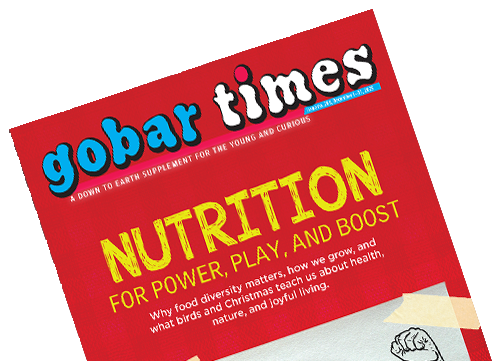
Entrepreneurial projects and learning-by-doing activities help build environmental consciousness among young school children. ************************************************************************ Our surroundings are indispensable to our survival. Hence, environmental conservation has become a high priority the world over, owing to climate crisis, pollution, land degradation, etc. Environmental awareness can be attained by changing the attitude...

A desire for a magazine that focuses on well-identified environmental concerns and concrete tangible solutions. ************************************************************************************* It is our collective responsibility to maintain our earth as a habitable place for our present and future. Today, more than ever before, we are facing environmental challenges that can spiral into major crises unless we take urgent corrective measures. We have to strive to execute our actions points and Gobar Times provides us a wonderful platform to achieve them...

Do we ever stop to think where all the trash that we produce goes? Most of it heads to a dumpsite – yes, those mountains of waste that you might have seen on one of your trips around the city. Let's dig into this subject a bit, shall we? ********************************** A huge dark mountain is looming up amidst houses and buildings, with a flock of crows and eagles circling over it. As one goes closer, you can see people on it...

A snippet of the vibrant activities conducted from the kindergarten tiny-tots to the high-school teenagers under the Green Schools Programme ************************************************************************************** Online education became the talk-of-the-town in 2020 when the entire globe succumbed to an unknown lockdown for more than 300 days. Students became weary and so the entire education community sprung up to the challenge. Country-wide they took to their screens like wildfire, proving their resilience in a jiffy. At the Pawar Public School, Chandivali, we went a step beyond with the Green Schools …

A resolution by Leaders to save humanity from drowning in ‘Plastic’. ******************************************* On March 2, 2022, representatives from over 200 countries gathered in Nairobi, Kenya for the continued fifth session of the United Nations Environment Assembly. The assembly then created history when 175 countries unanimously agreed on a United Nations framework to fight global plastic pollution from cradle to grave...

India has more than 1.5 million schools and 260 million students. Think about a regular day in these schools before the pandemic. Imagine the amount of waste— food waste, plastic, paper, stationery—produced in these schools in a day. Now, add COVID-19 waste to it as schools across the country are reopening. Imagine all of this waste going to landfills. Alarming, isn’t it?

The market today is flooded with bright, shiny toys and soft clothes for babies. But how is this related to microplastics in their feces? The market today is flooded with bright, shiny toys and soft clothes for babies. But how is this related to microplastics in their feces? Most products today like sipper cups, lunch boxes, baby bottles and wiping napkins are made of a substance called PET or polyethylene terephthalate. PET is taken from natural gas and crude oil. It is also another version of the polyester fabric...

A group of college students from South Delhi's Aryabhatta college has started a unique initiative. They call it Project Palaash. Project Palaash aims to salvage floral waste and create organic dyes that are purely non-synthetic in nature. These organic dyes are then used on fabrics. These fabrics are dyed by the socially and economically underprivileged, thereby creating employment opportunities for destitute community members.

